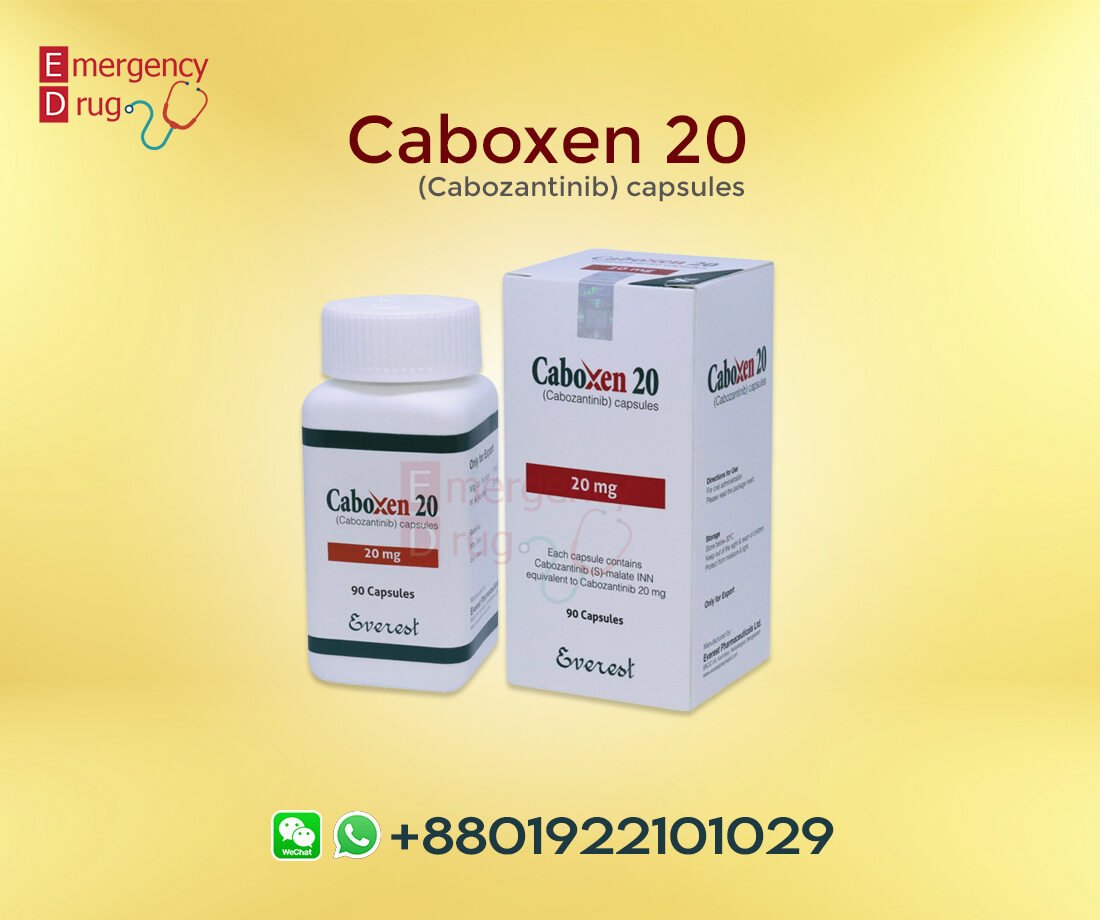Cabozantinib
Showing all 6 results
-

Cabanib (Cabozantinib) 20 Mg – 90 Capsules
$200.00 Add to cart -

Caboxen (Cabozantinib) 20 MG – 90 Capsules
$200.00 Add to cart -

Caboxen (Cabozantinib) 80 MG – 30 Capsules
$225.00 Add to cart -

Cabozanix (Cabozantinib) 20 MG – 90 Capsules
$810.00 Add to cart -

Cabozanix (Cabozantinib) 60 MG – 30 TABLETS
$890.00 Add to cart -

Cabozanix (Cabozantinib) 80 MG – 30 Capsules
$925.00 Add to cart
Cabozantinib Drug
Indications
Cabozantinib is a medication used primarily in the treatment of certain types of cancer. It is a small molecule inhibitor that targets multiple tyrosine kinases involved in tumor growth, angiogenesis, and the metastatic progression of cancer.
Cabozantinib is approved for the treatment of:
Advanced Renal Cell Carcinoma (RCC): Often used after prior anti-angiogenic therapy.
Hepatocellular Carcinoma (HCC): For patients who have been previously treated with sorafenib.
Medullary Thyroid Cancer (MTC): For cases that are progressive, metastatic, or unresectable.
Trade Names
Cabozantinib is marketed under the brand names Cabometyx (for RCC and HCC) and Cometriq (for MTC).
Cabozantinib FDA Approval
Cabozantinib, discovered and developed by Exelixis Inc., has achieved several significant milestones. The FDA granted it orphan drug status in November 2010 and again in February 2017.
In November 2012, the FDA approved cabozantinib in its capsule form, marketed as Cometriq, for treating medullary thyroid cancer, with the European Union following suit in 2014.
The tablet formulation of cabozantinib received FDA approval in April 2016 as a second-line treatment for kidney cancer, with the European Union granting approval in September 2016.
In December 2017, the FDA approved cabozantinib, under the brand name Cabometyx, for treating advanced renal cell carcinoma. Additionally, in January 2019, the FDA approved Cabometyx for treating hepatocellular carcinoma in patients previously treated with sorafenib.
It is important to note that Cometriq and Cabometyx have different formulations and are not interchangeable.
Mechanism of action
Cabozantinib works by targeting specific proteins in cancer cells that help them grow and spread. Here’s a simple explanation of how it works:
Understanding Cancer Growth: Cancer cells grow and spread by using various signaling pathways, which are like communication networks inside the cells. These pathways tell the cells to keep growing and dividing.
Role of Tyrosine Kinases: Certain proteins called tyrosine kinases are crucial parts of these signaling pathways. They act like switches that turn on signals for the cancer cells to grow and form new blood vessels to supply the tumor with nutrients.
How does Cabozantinib Works: Cabozantinib is a type of drug known as a tyrosine kinase inhibitor. It works by specifically targeting and blocking several of these tyrosine kinases, including VEGFR (vascular endothelial growth factor receptor), MET (mesenchymal-epithelial transition factor), and RET (rearranged during transfection).
Blocking Growth Signals: By inhibiting these tyrosine kinases, cabozantinib effectively turns off the signals that tell cancer cells to grow and form new blood vessels. This not only slows down the growth of the cancer cells but also cuts off the blood supply they need to survive.
Promoting Cancer Cell Death: Without the growth signals and blood supply, the cancer cells become weaker and are more likely to die off.
In summary, cabozantinib works by blocking specific proteins that cancer cells use to grow and spread. By turning off these proteins, it helps to slow down tumor growth and cut off the blood supply to the cancer cells, leading to their death.
Cabozantinib Side Effects
Common side effects of Cabozantinib, affecting more than 10% of people, include:
- Appetite and Nutrient Levels: Decreased appetite; low calcium, potassium, phosphate, and magnesium levels; high bilirubin levels.
- Sensory Changes: Distorted sense of taste and hearing, headache, dizziness, earaches, and sore throat.
- Gastrointestinal Issues: Diarrhea, nausea, constipation, vomiting, stomach pain and upset stomach, mouth and lip inflammation, and a burning sensation in the mouth.
- Skin and Hair: Skin peeling on the palms and soles, changes in hair color, hair loss, rash, dry skin, and red skin.
- Musculoskeletal: Joint pain and muscle spasms.
- General Health: Fatigue, weakness, weight loss, elevated transaminase levels, higher cholesterol levels, and reduced red and white blood cells.
Cabozantinib adverse effects, affecting between 1% and 10% of people, include:
- Infections: Abscesses (inside the body, on the skin, and in teeth), pneumonia, inflamed hair follicles, and fungal infections.
- Hormonal and Fluid Issues: Low thyroid levels, dehydration, and loss of albumin.
- Mental Health: Anxiety, depression, and confusion.
- Neurological: Peripheral neuropathy, tingling, and tremor.
- Sensory: Tinnitus.
- Cardiovascular: Atrial fibrillation, low blood pressure, and blocked veins.
- Blood and Circulation: Paleness, chills, fistulas forming in the trachea and esophagus, blood clots in the lungs, and bleeding in the respiratory tract.
- Digestive System: Gastrointestinal perforation, bleeding in the stomach and intestines, pancreatitis, hemorrhoids, anal fissure, anal inflammation, and gallstones.
- Skin: Hard skin growths, acne, blisters, abnormal hair growth, loss of skin color, and skin flaking.
- General Health: Chest pain, blood or protein in urine, wounds that don’t heal well, and facial swelling.
Dosage And Administration
Medullary Thyroid Cancer (MTC) – Cabozantinib capsule (Cometriq): The recommended dose is 140 mg once daily (one 80 mg capsule and three 20 mg capsules).
Renal Cell Carcinoma (RCC) – Cabozantinib tablet (Cabometyx): The recommended dose is 60 mg once daily. Same for Hepatocellular Carcinoma (HCC) once daily, for patients who have previously been treated with sorafenib.
How to take cabozantinib?
Cabozantinib capsules or tablets should be swallowed whole and it should not be opened. A missed dose should not be taken within 12 hours of the next dose. Foods (e.g., grapefruit, grapefruit juice) or nutritional supplements should not be taken that are known to inhibit Cytochrome P450 while taking Cabozantinib. Or, as directed by the registered physician.
For dosage modification contact your doctor
